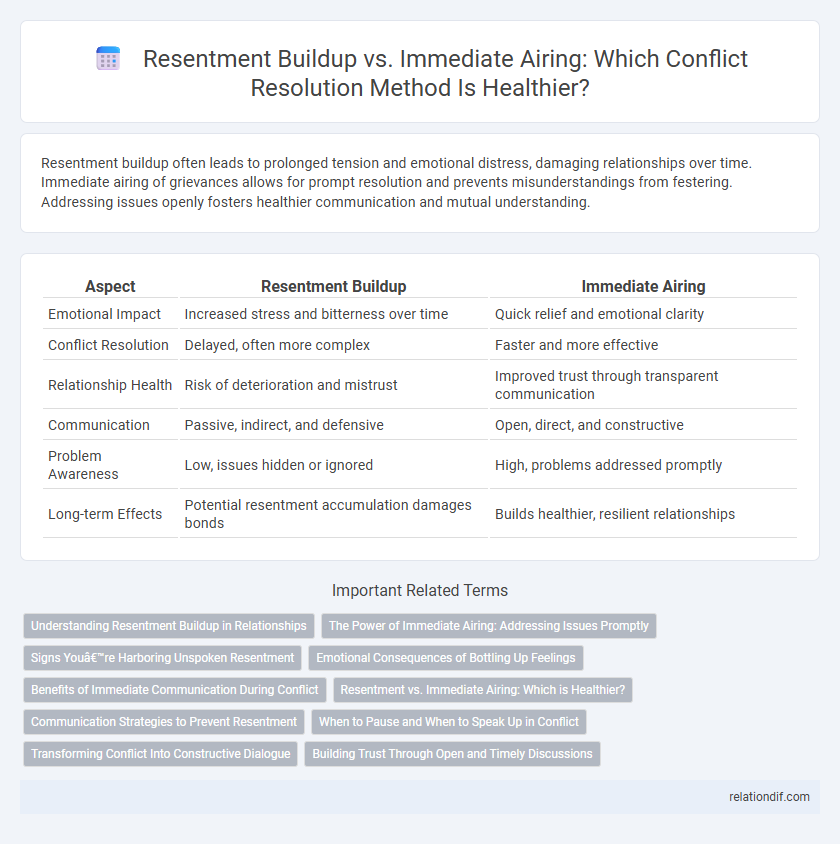Resentment buildup often leads to prolonged tension and emotional distress, damaging relationships over time. Immediate airing of grievances allows for prompt resolution and prevents misunderstandings from festering. Addressing issues openly fosters healthier communication and mutual understanding.
Table of Comparison
| Aspect | Resentment Buildup | Immediate Airing |
|---|---|---|
| Emotional Impact | Increased stress and bitterness over time | Quick relief and emotional clarity |
| Conflict Resolution | Delayed, often more complex | Faster and more effective |
| Relationship Health | Risk of deterioration and mistrust | Improved trust through transparent communication |
| Communication | Passive, indirect, and defensive | Open, direct, and constructive |
| Problem Awareness | Low, issues hidden or ignored | High, problems addressed promptly |
| Long-term Effects | Potential resentment accumulation damages bonds | Builds healthier, resilient relationships |
Understanding Resentment Buildup in Relationships
Resentment buildup in relationships occurs when negative feelings and unresolved issues accumulate over time, leading to emotional distancing and decreased trust. Immediate airing of concerns helps prevent misunderstandings, promotes transparency, and fosters healthy communication patterns. Recognizing early signs of resentment allows partners to address conflicts constructively before bitterness compromises the relationship's foundation.
The Power of Immediate Airing: Addressing Issues Promptly
Immediate airing of conflicts prevents resentment buildup by enabling open communication and swift resolution. Promptly addressing issues reduces emotional escalation and fosters trust, creating a healthier environment for dialogue. Timely confrontation promotes clarity and understanding, minimizing misunderstandings associated with delayed grievances.
Signs You’re Harboring Unspoken Resentment
Persistent irritability, frequent mood swings, and a growing sense of dissatisfaction often indicate unspoken resentment. Avoiding direct conversations about grievances while replaying negative experiences in your mind signals a buildup of unresolved conflict. Physical symptoms like tension headaches or disrupted sleep patterns can also reveal the hidden emotional burden of harboring resentment.
Emotional Consequences of Bottling Up Feelings
Bottling up feelings during conflict often leads to intensified resentment, increased stress, and emotional exhaustion that can damage mental health over time. Suppressed emotions may manifest as anxiety, depression, or physical symptoms, undermining overall well-being and relationships. Immediate airing of feelings promotes emotional clarity, reduces psychological burden, and fosters healthier conflict resolution.
Benefits of Immediate Communication During Conflict
Immediate communication during conflict prevents resentment buildup by addressing issues before they escalate, fostering clarity and mutual understanding. Expressing feelings promptly promotes emotional release and reduces stress, enhancing relationship satisfaction. Transparent dialogue supports faster resolution and maintains trust between parties, minimizing long-term damage.
Resentment vs. Immediate Airing: Which is Healthier?
Resentment buildup often leads to increased stress, emotional distance, and deteriorated relationships due to unexpressed frustrations festering over time. Immediate airing of conflicts fosters open communication, enabling quicker resolutions and promoting emotional clarity, which supports healthier interpersonal dynamics. Research indicates that constructive conflict expression reduces long-term psychological strain compared to suppressed emotions, highlighting the benefits of timely dialogue.
Communication Strategies to Prevent Resentment
Effective communication strategies to prevent resentment focus on immediate airing of concerns through open and honest dialogue. Encouraging active listening and emotional validation reduces misunderstandings and allows grievances to be addressed before they escalate. Establishing regular check-ins and safe spaces for sharing feelings fosters trust and minimizes resentment buildup in relationships.
When to Pause and When to Speak Up in Conflict
Resentment buildup occurs when emotions and grievances are suppressed over time, leading to increased tension and misunderstandings in conflict situations. Immediate airing of concerns fosters open communication but may escalate conflicts if expressed impulsively or without tact. Knowing when to pause allows for emotional regulation and reflection, while speaking up at appropriate moments ensures clarity and resolution in disputes.
Transforming Conflict Into Constructive Dialogue
Resentment buildup often intensifies emotional barriers, making resolution more difficult by deepening misunderstandings and mistrust between parties. Immediate airing of grievances allows for timely expression of feelings, preventing escalation and fostering mutual understanding. Transforming conflict into constructive dialogue requires active listening and empathetic communication to convert potential hostility into collaborative problem-solving.
Building Trust Through Open and Timely Discussions
Resentment buildup often damages relationships by creating barriers to trust and understanding, whereas immediate airing of concerns fosters transparency and emotional honesty. Open and timely discussions allow parties to address issues constructively, preventing misunderstandings and deep-seated grievances. Prioritizing communication enhances conflict resolution and reinforces trust in both personal and professional environments.
resentment buildup vs immediate airing Infographic

 relationdif.com
relationdif.com